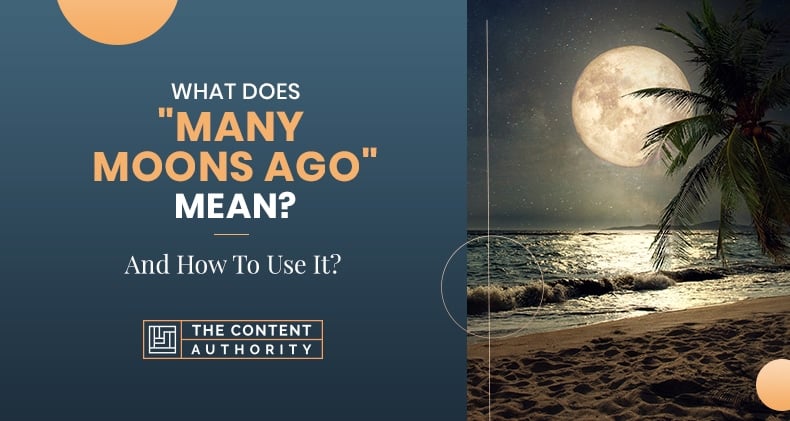Every language has a few expressions that date back centuries. Most of us find those expressions weird or out of date. But looking back at the origin, we may be surprised that there was a time when it made sense.
“Many moons ago” is a phrase that means “a long time ago.” It is an old-fashioned expression that uses the moon to refer to months, and the meaning is literal.
With phrases like this one, we can instantly tell that they come from another culture and time. It sounds even romantic to say “many moons ago,” but does it make any sense? Can we measure time using the moon? When the expression was created, did they know how to measure time? Is that a fact-based expression or just a made-up one to sound poetic? Am I asking too many questions?
There is no doubt poetry loves these sort of phrases, and there are a few that don’t relate to reality very much. They sound great but are not very applicable. It seems the phrase is just a popular way to refer to an old measure of time used around the 18th century. Let’s dig in on the origins of this expression and see what we can conclude from it.
Origin Of The Phrase
In my search for information about the moon and its relation to the calendar, I found that the words “month” and “moon” have the exact origin. Words like that are called lexical cognates. It happens with words that come from the same root language or same “parent language.” In this case, “moon” and “month” come from the same place, but where is the relation? A month is all the time it takes the moon to pass all its phases crossing the sky. That’s roughly 29.53 days.
People have been using the moon to count days since the Paleolithic age. Its usage dates back to the 18th century. Today, some calendars still use the moon to calculate the dates in connection with Earth’s sunlight and the orbital period.
This expression originated with Native Americans, the Cuna Indians, or the Kuna people. Their time tracking techniques differed from ours. They kept track of time by using the moon’s and sun’s positions concerning the Earth. Therefore, the phrase’s meaning is to mention that you are talking about an event that happened a long time ago. You say “many moons ago” because the moon has been through its phases and around the world several times since the “event” happened.
A Little About Native Americans And The Calendar

The native Americans guided themselves when traveling by interpreting the sun’s position or by observing the trees according to the wind and its direction. They had a ton of information about nature. If they got lost at a point in their journey, they knew which way was south by notching the bark of a tree’s thickest side. That side was always in the direction of the sun.
Tribes had different definitions of the year and its months according to the moon. For some, the year was divided into four seasons like ours today, and the difference was that the year started in spring or fall. Other tribes had five seasons or divided the year into twelve or thirteen moons. Speaking of thirteen, some tribes added an extra moon every couple of years to keep it synchronized with the seasons. All tribes had a naming system for their calendars. They named their moons, months, and seasons. In some cases, the names used to change from year to year. Similarly, in some cases, the names were the same as those of other tribes.
There is a Native American legend that tells that good and evil spirits had an agreement. They agreed that twelve moons should be the division of the calendar year. This amount of moons was related to the number of lines in a chipmunk’s tail. The six black stripes represented the ‘summer moons’ and the six white stripes ‘winter moons.’ Consequently, ‘moon’ refers to ‘month’ and, as I said before, is an ancient measure of time.
The Moon
The moon is our natural satellite here on Earth, and it’s about one-quarter of the planet’s diameter. In our Solar System, it is the biggest natural satellite in relation to its planet. The moon orbits around the Earth in 27.3 days. That changes during a synodic period to 29.5 days. As a result, the visible part lighted by the sun ranges from 0 to 100%. That transition results in lunar phases, which is the basis for the lunar calendar.
The orbital period, concerning the moon, is the time it takes to complete one orbit around Earth. It applies to other astronomical objects like asteroids or planets orbiting around the Sun. Also, exoplanets orbiting stars.
The sidereal period is the time the moon takes to make a complete orbit relative to the stars, which means other elements of space interact with it. This is in a non-rotating frame of reference.
The synodic period is the time it takes the moon to reappear at the same position concerning other objects like the Earth and the Sun.
The lunar or moon phases are the appearances of the moon directly viewed from Earth. The visible side of the moon is related to sunlight and depends on the moon’s orbit. It goes from 0% sunlight (new moon) to 100% sunlight (full moon). Each “intermediate” phase lasts approximately 7.4 days, with a small change due to the moon’s orbit’s elliptical shape. There are four principal lunar phases: the new moon, first quarter, full moon, and last quarter.
Synonyms And Antonyms
Synonyms: yonks ago, years ago, very long time ago, some time ago, once upon a time, many years back, many years ago, long time ago, long since, long ago, in the past, in the old days, donkey’s years ago, back, away back, at one time, at a time in the past, at a certain point, antecedently, anciently, already, ahead, ages ago, aforetime.
Antonyms: Recently, over the years, of late, instantly, future, forthwith, for years, for the recent years, for the last years, for some years in a row, for some time past, first off, during recent years, directly, currently, away, at this time, at this moment, at the present, at the moment, at once, as of late, any more, anew, afresh.
More English Idioms
Examples Of The Phrase In A Sentence
- I asked for that many moons ago, and just recently, she replied to me. But it was worth the wait.
- We met many moons ago at our last show. Since then, we have become friends and have been inseparable.
- He left the company many moons ago fighting about lots of things.
- When I got my first guitar many moons ago, my mother almost passed out.
- I went to my old university last night for the first time in many moons.
- I remember that, but it was many moons ago.
- I saw him twice, many moons ago, in the movie theater. We exchanged words briefly and went our separate ways.
- Even though I went to China many moons ago, I still feel the great vibe from my old neighborhood.
- Many moons ago, I used to be really outgoing when meeting new people. After all of this, I have become more reserved.
- In school, I was the president of my class. But that was many moons ago.
- She said that she took the cat to the vet many moons ago. It was time for a check-up!”
Conclusion
We have covered many topics related to the moon and the phrase mentioned previously. But basically, they all point to the same meaning. “Many moons ago” is an expression that is related to time passed. This is because, in the past, native Americans used to measure time according to the moon’s orbit around the Earth. That time is around twenty-seven to twenty-nine days, essentially a month. That’s the relation between both words, “moon” and “month.”
To conclude, I hope that you, in the future, say that “many moons” ago, you read the definition of that phrase, and that’s why you use it so well.”
Shawn Manaher is the founder and CEO of The Content Authority. He’s one part content manager, one part writing ninja organizer, and two parts leader of top content creators. You don’t even want to know what he calls pancakes.



